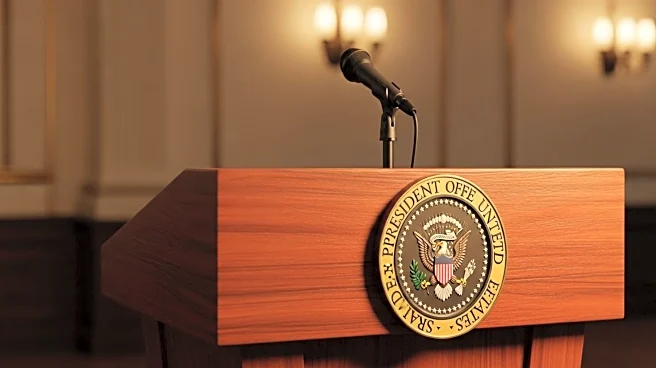What's Happening?
President Donald Trump has addressed rumors concerning his health following a period of absence from public events. Speculation arose on social media due to his lack of appearances, prompting questions about his well-being. Trump responded to these rumors during a public event, labeling them as 'fake news' and asserting that he was active over the weekend, engaging in interviews and posting on his social media platform, Truth Social. Despite concerns, Trump stated he 'never felt better in his life.' The White House has disclosed that Trump suffers from chronic venous insufficiency, a common condition among older adults, which has led to visible bruising and swelling. Press Secretary Karoline Leavitt attributed the bruising to frequent handshaking and regular aspirin use.
Why It's Important?
The health of President Trump is a matter of public interest, given his influential role in U.S. politics. Speculation about his health can impact public perception and political dynamics, especially as he remains a prominent figure in national discourse. Transparency regarding his health is crucial to maintaining public trust and ensuring stability within the administration. The rumors highlight the ongoing scrutiny faced by political leaders and the importance of clear communication from the White House to dispel misinformation. Trump's dismissal of the rumors also reflects his approach to handling media narratives and public concerns.
What's Next?
The White House may continue to provide updates on President Trump's health to address public concerns and prevent further speculation. Political opponents and media outlets might scrutinize these updates, influencing public discourse. Trump's active engagement on social media suggests he will continue to use this platform to communicate directly with the public, potentially shaping narratives around his health and political activities. The administration may also focus on reinforcing transparency to mitigate the impact of rumors and maintain confidence in leadership.
Beyond the Headlines
The incident underscores the challenges of managing public perception in the digital age, where rumors can quickly gain traction. It highlights the ethical considerations of privacy versus public interest in the health of political figures. The situation may prompt discussions on the role of social media in shaping political narratives and the responsibility of leaders to address misinformation. Long-term, it could influence how future administrations handle health disclosures and public communication strategies.










